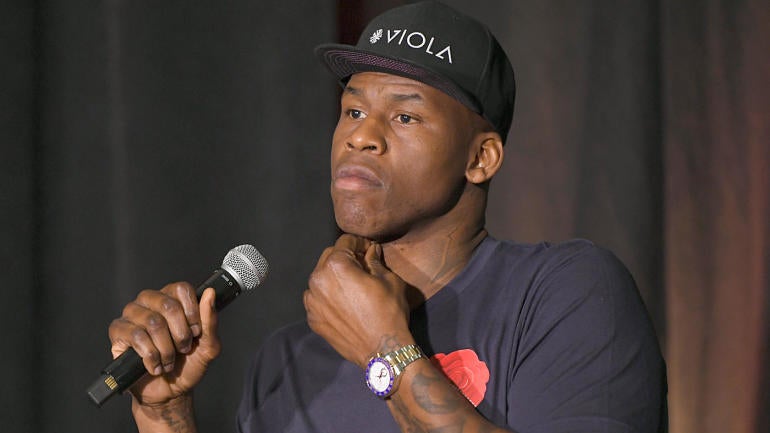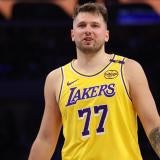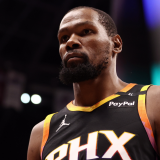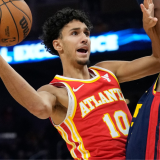
On Monday, Yahoo Sports' Chris Haynes reported that the NBA and the National Basketball Players Association have agreed that players will not be drug tested during its shutdown. (A source familiar with the agreement confirmed to CBS Sports that the league is suspending drug testing.) This news caught the eye of Al Harrington, who played in the NBA for 16 years and now runs a cannabis company called Viola, which opened its first dispensary four months ago in Detroit.
Harrington, 40, is optimistic about where things are going in his new industry, but he was wary about overreacting to the temporary change in his old one. When the NFL's new marijuana policy was reported last month, he "got about 70 DMs of that from players, and then a couple text messages," Harrington said, "just kind of saying, 'When is it going to be our turn? When Are they going to stop checking us or putting us in the program over it." But then he saw that the NFL could still fine players up to three weeks of their salary, depending on how many times they test positive.
"It's kind of moving in the right direction, but it's not the actual win that I think all the players want," Harrington said.
In the same way, Harrington is not getting ahead of himself with the NBA. He thinks that the league is not drug testing during this period for logistical reasons -- it would be insane to send testers into players' homes right now -- and he does not predict that there will be a grace period for cannabis to get out of players' systems if the 2019-20 season resumes.
"I don't think they're doing it for any advantageous thing for the players, to have access to anything, if that makes sense," Harrington said.
In an interview with CBS Sports on the phone, Harrington discussed how he and his business are dealing with the pandemic, his advocacy work and more. The following Q&A has been condensed and lightly edited for clarity and flow.
CBS Sports: The news about the coronavirus is just getting worse, and yet we are seeing videos of people in Florida hanging out at the beach. How are you processing everything right now?
Al Harrington: I'm processing it in real-time. I can be honest, I was one of the people -- like, Stephon Marbury is a good friend of mine and he was living in China when all this happened and then obviously he came to the U.S. to get away from it and obviously had his finger on the pulse the entire time because he's a head coach over there. And he was telling me that this was way more serious than our government and [President Donald] Trump and everyone was actually playing it. So I was probably just like those people that were sitting on the beach still today, kind of like, "Oh, we've had these issues before and it's never been that serious." But this is the one time where this one actually is serious. Just wrapping my head around that. Just lifestyle changes. Like, washing my hands all the time. I always washed my hands, but never washed 'em this much. I didn't walk around with hand sanitizer. I didn't elbow-bump people when I saw 'em out, even family.
But that's the seriousness of this. And there's still a lot of information that they're still trying to figure out about this virus, to find out if it's something that we can just quarantine for a couple of weeks and be able to slow it down or if it's going to take us three months, six months. So that anxiety is definitely real, just kind of the unknown. But I hope that people that are in the lives of those young people that are down in Miami that were partying are letting them know, like, "Get your ass home, wash your hands and let's take this thing serious so that we can get past this and get back to normal life."
You started using cannabis to manage pain. In your life, has it been good for dealing with anxiety and stress, too?
AH: Man, cannabis has been great. Forget good. I mean, it's funny, I'm in Day 5 at home with my kids with this quarantine. If I didn't have cannabis, I'd probably be hanging off my roof right now. You know what I'm saying? So I believe cannabis can be used in so many amazing ways. And being able to relax and calm yourself down, slow your life down a little bit sometimes, for people dealing with anxiety issues, recovery, pain issues, there's just a lot of ways that people can benefit from having access to cannabis. It's a journey, right? The first time I ever tried cannabis, it was a bad experience, but thank God I was willing to try it again to find the right strains that I like, the proper dosages of CBD and THC that allow me to be able to operate at an optimal level in my life.
What have these last five days been like for your business?
AH: It's a challenge. I mean obviously we're working, a lot of conference calls, doing our department phone calls, going over different things. Obviously at a time like this you would expect for sales of cannabis to go up, which in places like California it did. But I just got a text two minutes before I got on the phone with you that the city of Detroit just closed down all the dispensaries. So now we can't dispense any product and we're kind of expecting that that's probably going to happen everywhere.
So it's going to be a trying time for all of us business owners in every vertical in this world right now. Cannabis is definitely going to be hit just as hard as any other industry, and we've gotta figure out a way to just kind of keep the lights on and just keep pushing through this time. My goal is to be able to try to keep paying all my employees through this time, which will be a challenge, but that's something that we're going to try to do. We just gotta figure it out daily. There's going to be a lot of phone calls over the next couple weeks.
I saw in Massachusetts dispensaries are staying open, but you can't browse. There's an argument that, with people using it for medicinal reasons, they should remain open.
AH: To me it's like it's a pharmacy. Are you going to close all the pharmacies? No. We can't. So I think that they need to figure out a way to keep the doors open, and maybe have rules of no more than two people in a dispensary at a time or whatever. But I beg of them to allow us to continue to operate our business because just in cannabis we have all kinds of challenges. A lot of times we don't have access to these business loans and different things because, you know, cannabis is still federally illegal nationwide. So I just hope before they make these decisions, they keep that in mind.
In response to COVID-19, Ohio is letting out low-level offenders from jail, including drug offenders. As more states do that, does that help with the advocacy work that you're doing?
AH: Yeah, definitely. I mean, they gotta change these laws. They gotta allow these people to expunge these records, allow them to be able to get back in society and not have to continue to suffer from an offense that now is legal. Right now it's a billion-dollar industry. Not only are the vendors making money, but the states are making money, making $300M-500M in tax revenues off of this plant and off of this opportunity. So yes, we have to figure out a way to right the wrongs for these people that have suffered for so long. And one of the main ways is I think expungement. It's key, it's huge because we need to allow these people to be able to get back into a workforce and be able to just be regular citizens.
How much of your time is devoted to that? What goes into the advocacy part of your life?
AH: I do it every day. Part of my day, every day, has something to do with my advocacy or social equity. And the way I do it is interviews like this, right? Always being able to speak on it, make it a topic, something that people can't get around. Like, we cannot forget the people who suffered to get us to this point in this industry. We just cannot do it, and I'm not going to allow it to happen. I will speak on this until I'm probably in the grave because I think that is the kind of work that it's going to take before it actually changes.
David Stern told you he thought the NBA could potentially "lead the way" in terms of removing marijuana from the banned substance list. Now you can make the case the league is being slow. Do you think there's still an opportunity to lead?
AH: The NBA still can be the first league to just say they're no longer testing, period. [Note: The NHL tests, but doesn't punish.] Like, they're going to be done with it, if a player chooses to use, he just has to use responsibly, just the same way he has access to liquor. If you drink liquor, you come to the game drunk, you're in trouble. You're not going to play that game, you're going to get put in the program, all of the above. And I think that's the same thing with a player that has cannabis. If a player abuses the opportunity and he's not in his right mind to be able to play that night, then you penalize him for that.
I think that when you think about athletes just in general, we are very prideful. And we know that we have to be the best that we can be when we go out there and compete 'cause the guys we're playing are the greatest in the world. And I just don't see guys getting high or getting drunk -- which we don't already -- then going out and trying to play at a high level. I just think we need to give the athletes more credit, and understand that a lot of players are using it for recovery. Even the stress of the world, anxiety. I know so many guys that use it just to be able to calm down and be able to cope with a lot of issues that they have to deal with in their lives.
![[object Object] Logo](https://sportshub.cbsistatic.com/i/2020/04/22/e9ceb731-8b3f-4c60-98fe-090ab66a2997/screen-shot-2020-04-22-at-11-04-56-am.png)


















